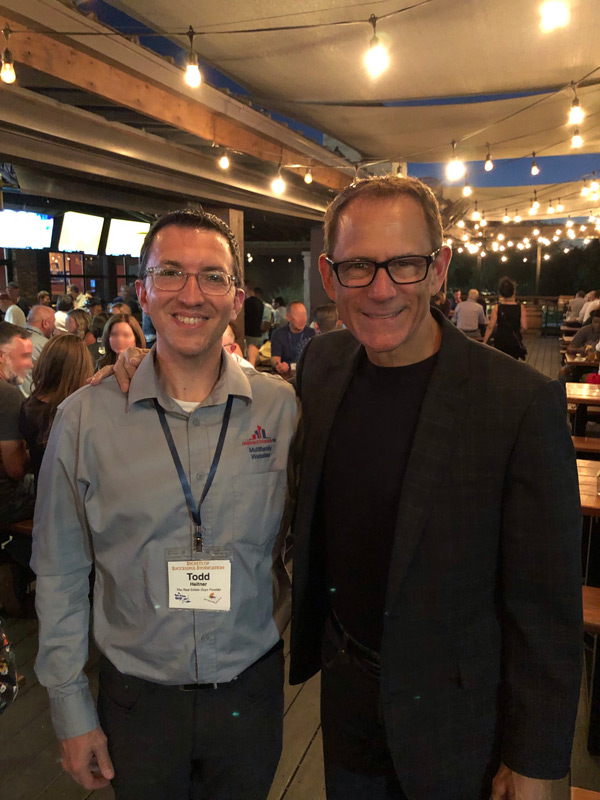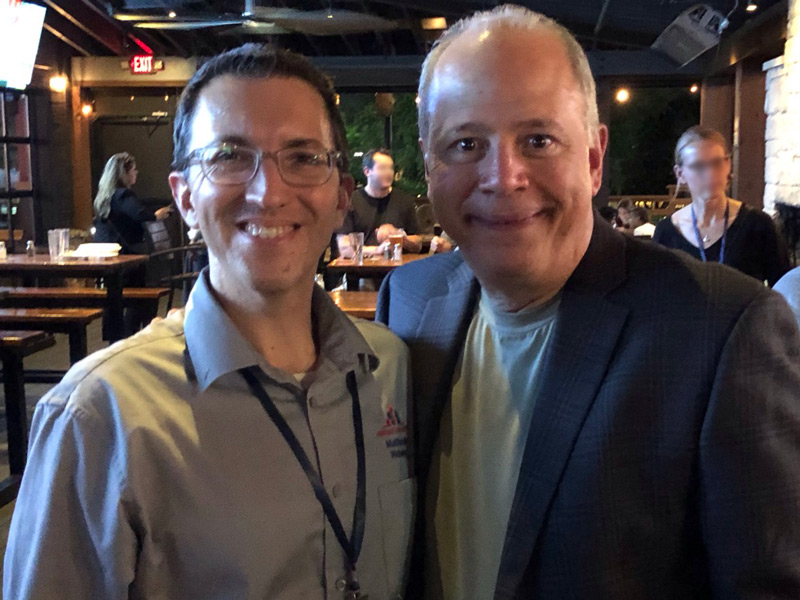I recently got back from Secrets of Successful Syndication, hosted by The Real Estate Guys in Dallas. I thought I’d share a few points from my notes.
There was a lot of information so I’m just going to share a few highlights.
This was my first time attending Secrets of Successful Syndication. Compared to other events that focus specifically on multifamily, this event is broader. It’s like zooming out and looking at syndication as a whole, independently of what type of asset it is that’s being syndicated. Of course, the most common asset is multifamily, so a lot of the information was geared toward that, but there were other examples too.

“You can be conventional, or you can be wealthy.
Pick one.”
– Dave Zook

There were around 270-280 in attendance, which they said was a new record for this event.
I won’t go through each presentation, and I didn’t take notes on things like the mechanics of syndicating since that information is pretty easy to come by. My notes will include information that was either new to me or a different way of looking at things, along with some powerful quotes, book recommendations, and other resources.
Even though you may be focused on multifamily, your investors currently have their money sitting somewhere else, probably in some other kind of investment. Yes, you need to thoroughly understand multifamily syndication, but you also need to understand other types of investing so you can talk to your investors and help them compare what they’re doing now with what you’re offering. For example, stocks and bonds, precious metals, etc.
“You already know they need your service, but you need to help them come to that conclusion on their own.”
Delivering bad news early builds trust.
Know what your capital wants. In other words, know what is important to the people you’re trying to raise money from. It may be different from what you want. For example, maybe you want to make your first million dollars. They may already have that. They may be more interested in tax breaks or wealth preservation. Don’t pitch them on what you want.
SEC
You probably realize that if you’re using the 506b route that you can’t advertise or solicit for a deal unless you have a pre-existing substantive relationship with them. But if you’re using 506c you’re able to advertise deals publicly, but can only accept investments from accredited investors.
Only about 8-10% of syndicators are going the 506c route. One reason up until now 506c hasn’t taken off better is the verification process for accredited investors. The actual process can be handled by a third party and isn’t something you personally have to be involved in. But the problem was that the verification used to only be good for 90 days. In some cases a deal might take longer than that to close and then you’d have to do it again.
But in March of this year, the investor verification requirements were relaxed, so that now you generally will only need to verify someone’s accredited status every five years. That’s a big change, and should make 506c more attractive.
Additionally, there is a new way to be considered accredited, which isn’t related to income. There are several types of financial professional licenses that qualify a person as well.
Taxes
Tom Wheelwright gave a presentation, which was great as usual. I saw him speak at Brad Sumrok’s AIMNATCON event a couple months ago. If you haven’t read my notes from that, you can read them here.
He spent quite a while on a concept from “Cash Flow Quadrant” by Robert Kiyosaki. Tom is Robert Kiyosaki’s accountant, by the way. If you’re not familiar with the cash flow quadrant, I’d suggest reading the book or at least search for “cash flow quadrant” on Google and the images will give you the general idea of the concept.
With recent tax laws, $400K is the magic number for income, to keep your income under to avoid higher tax rates
4 Rules about tax deductions:
-
- Business Purpose (First off, you must have a business. The expense must be for a business purpose.)
- Ordinary (It should be a typical expense for your type of business.)
- Necessary (It must be profitable.)
- Documented. (You must have good records.)
If you’re in a high income tax bracket, you’ll be 3-4 times more likely to be audited over the next couple years due to recent changes.
Tom mentioned a couple new tax laws. I’m not sure when they take effect, and my notes on them are brief so you’ll need to talk to a good CPA for more details.
- You won’t be able to invest in a syndication through an IRA
- Carried interest
Tom says if you don’t do cost segregation that you don’t deserve to be a syndicator (because of the tax savings to you and your passive investors if you have a good CPA).
Tom gave away a free guide, which you can get by texting GUIDE to 480-470-4180.
Funding
Pre-approved doesn’t exist in commercial real estate.
Lenders are primarily concerned with two things:
- How are you going to pay them?
- What happens if you don’t?
Lenders want to see third party management.
Book recommendations:
“The Go Giver”
“The Wizard of Lies”
“Conspiracy of the Rich”
“Good to Great”
Build Your Brand and Your Network
Russell Gray gave a presentation about Branding and building your network, which he said is the most important part of this event (and the one I took the most notes on). He said branding is like having superpower.
“Your network is your net worth.”
“Your most important skill is sales.” – Robert Kiyosaki
“Be authentic, be who you are, or at least who you want to become.”
“Sales solves nearly every problem.” – Ken McElroy
“Nothing happens until someone sells something.” – Thomas Watson, CEO of IBM
“Salesmanship is an essential survival skill.” – Russel Gray
Bring your solutions, not your needs to the market. The market will reject you if come with needs. For example, you need to get a certain return on a deal, but the market doesn’t care about that. You won’t get it just because you need it. If, instead, you come with solutions, you’ll do well.
Be a farmer, not a hunter.
The idea here is that a hunter goes out and looks for one meal, but a farmer plants seeds that grow slowly but will produce an abundance of food. Think of a cheetah hunting and killing a small animal. It will eat for one day from that, but that animal will not provide any food for it in the future. On the other hand, a farmer plants seeds and will get many meals from his work, far into the future, and the plants that grow will produce more seeds, and the process can continue.
“Delay gratification.”
How does this relate to syndication?
You could aggressively go after investors and just see dollar signs when you look at people, and you might get some investors. But that approach is likely to leave a bad taste in their mouth and they may not want to invest with you in the future, and may not encourage any of their friends to invest with you. But if you treat people well and build relationships, and genuinely provide value to people, you never know which of those relationships will sprout. One investor may invest with you over and over again. And even if someone you’re talking to doesn’t invest with you, they might refer one or more other people to invest with you.
“The reason most people fail instead of succeed is they trade what they want most for what they want at the moment.”
– Napoleon
I’ve included a similar topic in presentations I’ve given. I contrasted chasing versus attracting investors. When you chase investors, you can come across as needy or desperate. It’s a weak position, and can cause you to do things that really don’t make sense or to promise things you shouldn’t because you feel like you need the person’s investment.
On the other hand, when you attract investors, you are in a powerful position. You are the expert and they are coming to you because they want to invest with you. You’re attracting rather than chasing.
Back to the illustration of the farmer, he stakes out his territory. Similarly, you decide on the geographic and/or demographic you’re going to target. For example, one successful syndicator was a dentist and he raised money from other dentists.
Russel said that anybody in this room can do what the successful people in this room do. It does not require any innate ability.
When you plant an apple seed, it will produce season after season. This is like repeat customers. And then there are referrals, which are like dropped seeds. But, like farming, it takes patience. You have to nurture relationships.
Russell said “Assume the position and don’t wiggle.” You need integrity and need to be consistent. One stupid decision can ruin your reputation.
In talking about integrity, Russell has started trying to eat healthy and is on a fairly strict diet. Someone asked him what he eats on his cheat days. He said he doesn’t have cheat days. He said he was married for decades before his wife passed away and didn’t have any “cheat days” in his marriage, and he doesn’t with his diet either.
He talked about 5 things your reputation is built on:
- Presentation. This includes things like your look, your grooming, your dress. Basically how you appear to others. It should be consistent. Russell and Robert both wear a suit and tie. Some successful syndicators may have a different look. But they’re consistent. He mentioned that sometimes people are weary of someone who appears too flashy. For example, he was initially unsure about Brad Sumrok because he likes to show off his sports cars and things like that.
- Associations. Who you’re seen with, including in posts on social media. This can either help or hurt. You can take pictures with successful people and some of their authority is transferred to you.
- Endorsements. If you’re acting with integrity, people will say nice things about you. Capture those statements to share with others (like testimonials). Also, give great testimonials yourself for others. For example, when you attend a live event, sometimes the person putting on the event will ask for a testimonial. Give a great testimonial. That’s free exposure for you.
- Accomplishments. Your accomplishments give you credibility. For example, have you passively invested in deals? If so, you can say, “My partners and I own this deal with this many units.” And that’s 100% true. You can attach yourself to others’ accomplishments.
- Integrity & Consistency. Companies may say something like “Since 1997” – that shows a track record.
- Nobody gets to be a high level of anything without discipline. He referred to the concept of investing 10,000 hours into something. Figure out how to work that into your story. Build your brand by associating with lesser brands in their space.
What’s your focus? If it’s money or sales, you’re MISSING IT. It’s about your relationships. Your network. If you made the sale and walked away with the check but haven’t added them to your network, that’s a loss.
Invite people to “bring your friends” – recruit 2nd line relationships.
“Embrace the hard times and learn from them. Take the time to celebrate your wins.”
Power Networking – build substantive relationships with people. Pick something that is attractive to people you want to attract. He gave examples of ammo, tennis, cruises, etc. Things you love to do anyway, invite other people to do with you. Plant seeds.
There were several other important keys:
- Study. Be valuable to valuable people. Help people without viewing them as competitors.
- Write. For example, you can write blog posts or a book. It’s a way to organize your thoughts, which helps you later when you’re speaking or presenting.
- Lead. Make decisions. Step into the role. To change results, change actions, change thinking.
- Connect. Connect people who need to know each other.
Every single day, focus on building your brand and network.
Reputation is everything. Make sure you know what’s out there on yourself. Google yourself.
That’s something I speak about too. Investors and brokers will Google you. So it definitely makes sense to Google yourself and know what’s out there. That gives you a chance to clean up anything that will hurt your credibility.
That’s also an important reason to have a website with an About Us page. You have control over what’s on your website and the impression it makes. An About Us page is the first thing most investors will want to see. It’s also important because if someone is searching on Google for your name, if it’s on your website, your site will show in the search results.
As you probably know, that’s something we can help you with through our website service.
Finding Deals
They said the best deals to syndicate are simple deals, with a simple entrance strategy, simple hold strategy, and simple exit strategy (really with multiple exit strategies).
Quite a few people were interviewed who are doing interesting things in the world of syndication. I’ll just mention a few highlights.
“People want to buy enthusiasm – the music behind your words.”
Jean Gillen is a real estate agent in the Orlando area who only works with investors. She finds builders and developers and sells houses in bulk to investors.
Adriane Godby works for a company that does build-to-rent homes, duplexes, and four-plexes. If I remember correctly, I believe they offer management services for those as well, and have a more than 98% occupancy rate.
Bob Burr does oil and gas investments, and accredited investors can invest with him.
Eric Shelly does syndication for mobile CO2 carbon capture. They buy these carbon dioxide scrubbers and I believe they lease them to the major oil companies.
Wagner Nolasco does “tenant resilient investment properties”. Based in Florida, they build and sell new properties that are designed for investors, ready for tenants. They build them in a way that they’ll hold up under tenant use.
Frank and Sherri Candelario. They have something called Recovery Housing Academy. They do shared housing for people recovering from addiction and, if I understood correctly, people who have recently been released from prison. In both cases, the government pays well to have them housed. They buy nice houses in nice neighborhoods and the government pays per bed. They have a program where they teach other people how to do this too. It was an interesting concept because it provides housing to people who really need it, and is paid for by government programs. I believe there is some sort of syndication opportunity with this as well.
Cryptocurrency, Blockchain, Real Estate & Syndication
I won’t pretend I understood much of what was discussed in this section. But cryptocurrency is sometimes being used in syndications. One interesting thing is that it can provide more liquidity for passive investors in a deal. My understanding is that if they’re invested with cryptocurrency, and then sell that cryptocurrency, they’re essentially out of the deal and someone else is in it. And in that scenario, potentially a non-accredited investor could have an investment in a 506c deal that way. But again, a lot of this was over my head. I’m just sharing things I heard as I remember them and without a full grasp of the topic, so take it with a grain of salt. 🙂
Final Thoughts
Overall, it was a great event. I had some good conversations with Robert Helms and Russel Gray, and of course many other people.
We’re going to be at some other upcoming events this year as well. I know we’ll be at Jake & Gino’s event, as well as Rod Khleif’s. If you’ll be attending some events, be sure to look for me and stop and say hi. I’d love to meet you in person. We keep an updated list of upcoming multifamily events here. We have even arranged discounts for you on some of them. You can also sign up to be notified of new events periodically so you don’t miss anything.
